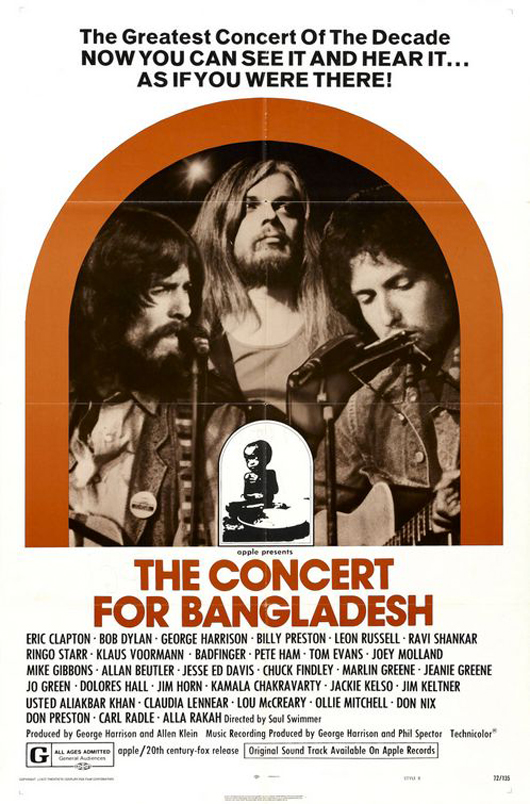More random music recollections based on the book Never A Dull Moment.

By today’s standards, or even by the criteria of rock benefit concerts later that decade, George Harrison had no idea what he was doing as a benefit organizer. The Concert for Bangladesh, initiated after the former East Pakistan suffered from massacres and famine, happened because the former Beatle saw the effect the tragedy had on his friend and teacher Ravi Shankar, a Bengali.
Harrison was able to line up Ringo Starr. Would there be a Beatles reunion, the press wondered? Er, no. The mysterious Klaus Voorman, who designed the Revolver cover, and played bass on John’s Live Peace in Toronto, was on board. But John wanted Yoko there too and that was the end of that. The only place the Beatles would all be together would be on the charts.
Longtime session musician Leon Russell was hot off Joe Cocker’s Mad Dogs and Englishmen tour. A drug-addled Eric Clapton was such an uncertainty that George had Peter Frampton show up at the rehearsals, just in case. Keyboardist Billy Preston, drummer Jim Keltner, the band Badfinger, and some of Russell’s cohorts completed the band. Both Harrison, who never had to be the front man before, and Bob Dylan, who had been out of the spotlight for some time, were nervous.
August 1 was the only available date at Madison Square Garden for the Bangladesh concert before Disney on Parade took over. Two shows at 2:30 and 8 pm. “There were no plans to broadcast the show live on radio or to record for TV.” Of the three cameras used to capture the show, “what survives is largely thanks to the camera that was in the pits.”
Meanwhile, Warner Brothers Records in Los Angeles was signing up artists with seemingly little concern for their immediate commercial viability. Randy Newman, Lowell George of Little Feat, Bonnie Raitt, Ry Cooder. Asylum Records, under David Geffen, was signing Jackson Browne and an unnamed group that would become The Eagles.
There were lots of accidental meetings of troubadours. Graham Parsons finds Emmylou Harris. Kris Kristofferson and Paul Anka meet on a plane, see each other’s gigs, and this led to the signing of Steve Goodman and John Prine. Jerry Jeff Walker hears an Anna McGarrigle song and pitches it to Linda Ronstadt; it was Heart Like a Wheel.
It was a magic, synchronistic time.
Listen to:
What is Life – George Harrison here or here
Willin’ – Little Feat here or here
City of New Orleans – Steve Goodman here or here
Hello In There – John Prine here or here




